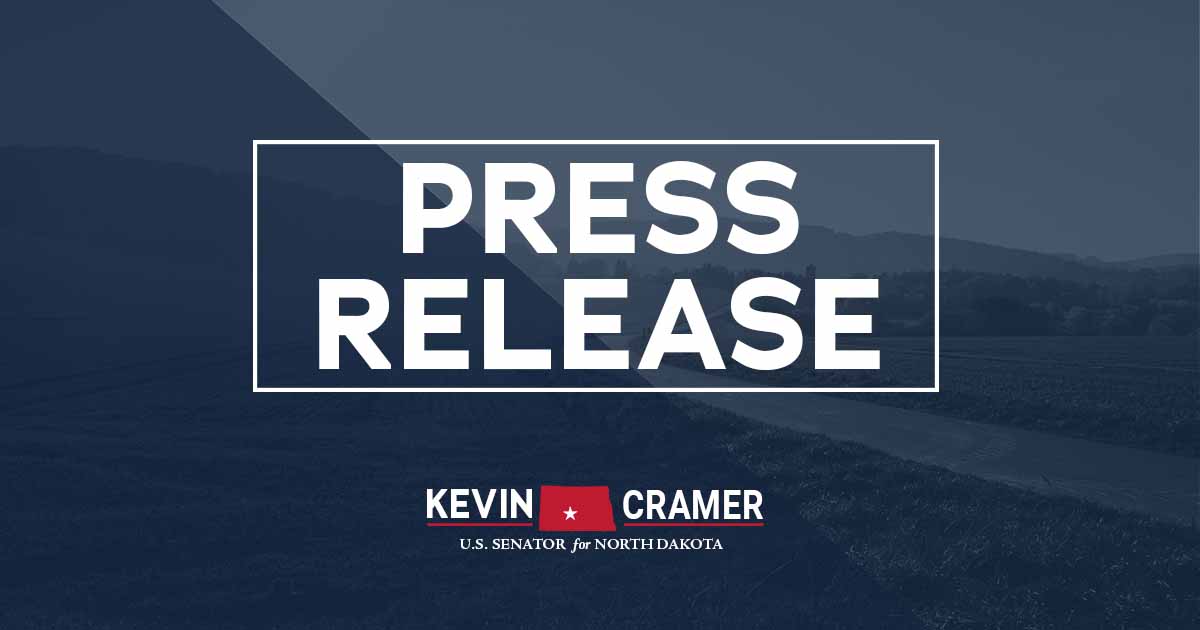Source: United States Senator Kevin Cramer (R-ND)
WASHINGTON – U.S. Senator Kevin Cramer (R-ND), a Senate Veterans’ Affairs Committee (SVAC) member, announced today the SVAC has voted to advance two of his bipartisan bills, the WWII Veterans Hospital and Medical Eligibility Act and a bill to strengthen the Solid Start program. The SVAC also voted to advance the Guaranteeing Healthcare Access to Personnel Who Served (GHAPS) Act, which Senator Cramer helped introduced as an original cosponsor.
“Today our committee passed bipartisan bills to ensure World War II veterans have access to health care services, bolster veteran outreach as they transition to civilian life, and improve access to care for veterans living in rural America,” said Senator Cramer. “I am grateful for my colleagues’ support, and I urge the full Senate to take our legislation and pass it.”
The WWII Veterans Hospital and Medical Eligibility Act is a bipartisan bill Senator Cramer is leading with Senator Bob Menendez (D-NJ) to ensure all World War II (WWII) veterans have access to health care services provided by the U.S. Department of Veterans Affairs (VA). Current eligibility limits in the law have prevented some WWII veterans from receiving these benefits.
“The world is a better place today thanks to the service and sacrifice of those who fought against tyranny during World War II. We should give them the highest quality care available without a second thought,” Senator Cramer said when the bill was introduced. “Our bill removes any roadblocks preventing these patriots from accessing the assistance they need and deserve.”
The bill to improve the Solid Start program is being led by Senator Cramer with Senator Maggie Hassan (D-NH). The program reaches out to veterans multiple times after they leave active duty to check in and help connect them to Veterans Affairs (VA) Department programs and benefits. The VA launched the Solid Start program in December 2019 with the goal of reaching out by phone to all newly separated veterans three times within their first year of separation to check in and help connect them to VA programs and benefits, regardless of separation type or characterization of service. The program also prioritizes outreach to veterans who accessed mental health resources prior to separation in order to quickly connect at-risk veterans to services. Their bipartisan bill would codify the program and authorize sufficient funding so that it can continue to serve veterans, and also makes improvements such as:
- Helping ensure veterans can be reached by collecting up-to-date contacting information during the transition process;
- Following up by mail or other outreach if a veteran does not respond to phone calls;
- Providing Solid Start information in VA printed materials and on the VA website;
- Giving women veterans with information that is tailored to their specific health care and benefit needs; and
- Connecting veterans with state and local resources, as well as local Veterans Service Organizations.
“Our bill would codify a flexible, personalized program which helps veterans return to civilian life,” Senator Cramer said when the bill was introduced. “These patriots put their lives on the line each day. We should give them all the resources they need to make that transition as easy as possible.”
The GHAPS Act is a bill led by SVAC Ranking Member Jerry Moran (R-KS) to address gaps in veteran health care to ensure the Department of Veterans Affairs (VA) is serving veterans in hard-to-reach places. It would aim to codify programs which have benefited veterans, remove bureaucratic barriers to care, and mandate the VA incorporate a telehealth strategy. The bill also seeks to apply lessons learned during the pandemic to close the gaps in VA health care that often leave behind rural and highly rural veterans, community care veterans and overseas veterans. Specifically, this legislation would close VA health care gaps by:
- Reaffirms MISSION access standards to protect veteran eligibility for MISSION’s Veterans Community Care Program.
- Directing VA to create a telehealth strategic plan to ensure the department is deploying virtual care thoughtfully and utilizing innovative solutions to deliver telehealth to rural veterans.
- Ensuring all veterans with treatment-resistant depression have access to the necessary evidence-based care to put them on the path to recovery.
- Cutting the red tape for VA research by removing the Paperwork Reduction Act requirements; ensuring veterans benefit from more timely research-informed care.
- Directing Government Accountability Office to produce a report on the Foreign Medical Program to evaluate whether the program is adequately meeting the needs of overseas veterans.
“No matter where they live or what they do for work, our veterans are heroes who deserve the best care this nation can provide,” Senator Cramer said when the bill was introduced. “The Guaranteeing Healthcare Access to Personnel Who Served Act would help bridge the gaps in care availability for veterans by evaluating telehealth services, removing bureaucratic barriers, and prioritizing efforts to reach veterans living in rural America.”
